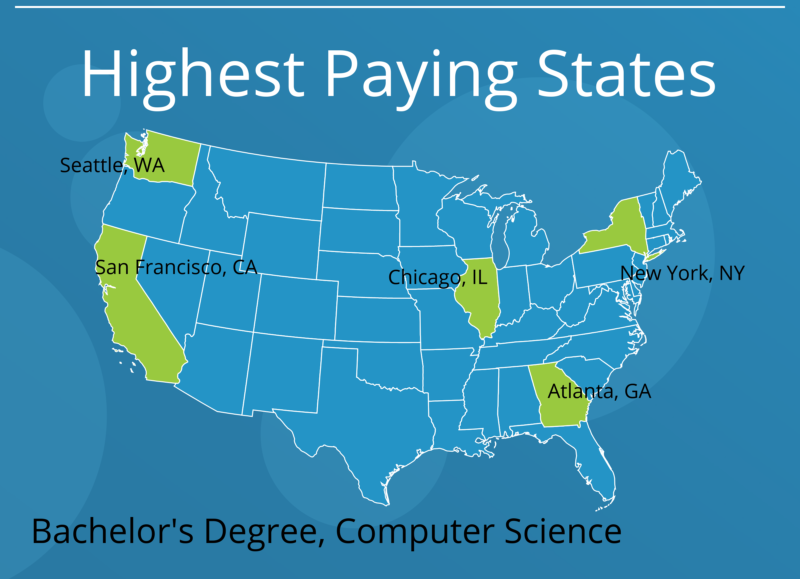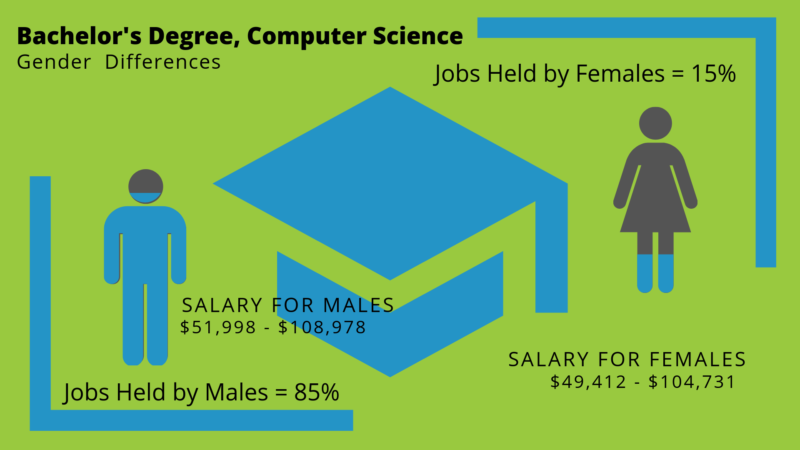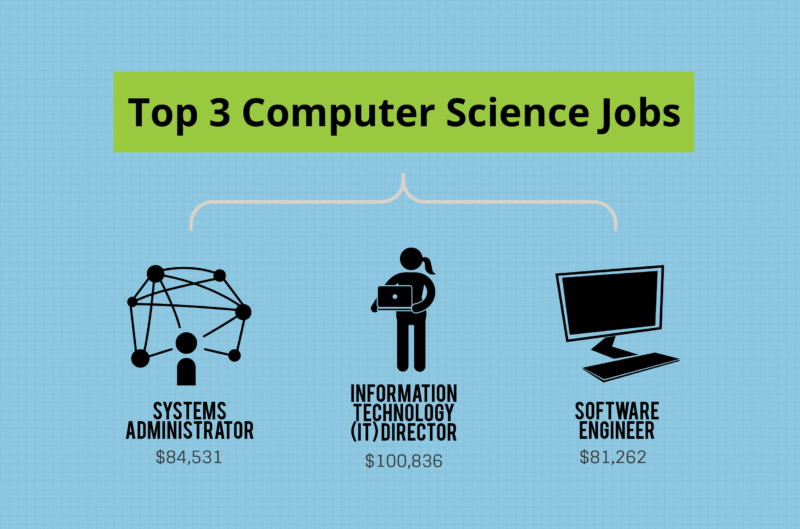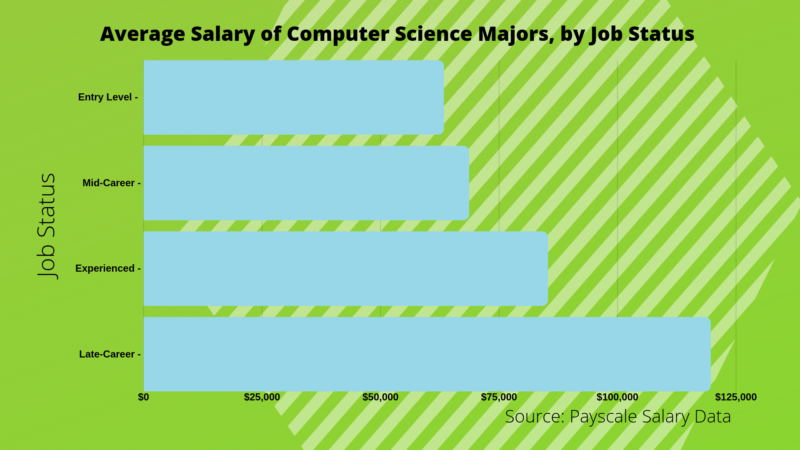Is a computer science degree worth it? It’s a question worth asking for students who are researching which careers are most likely to return on the investment of their time, work, and money. Sure, computers are basic to every part of modern life, but is a computer science degree still the best way to get into a career in technology? Can you even get a good job with a bachelor’s degree? And will a computer science degree still be valuable in the future?
According to the Bureau of Labor Statistics, technology careers are growing faster than average through 2026. The BLS further points out that the median pay for these jobs is $82,860. That’s good news, considering the average median wage for all positions across the country is $37,040 annually. Therefore, if your question is, “Is a computer science degree worth it,” the short answer is, “yes.” We’re going to dive into the long answer now.
Related:
- Top Online Schools for a Bachelor’s Degree in Computer Science
- Top Cheap Online Bachelor’s of Computer Science Degrees
- Top Bachelor of Computer Science Degree Programs
What is Computer Science Accreditation?
What makes a computer science degree worth it? When students are researching which school or university they should attend, it’s essential they pick an accredited program, whether they’re getting a computer science degree online or in a traditional on-campus format. Regional accreditation is the first hurdle of any college or university.
Despite the name, regional accreditation is actually the highest form; it covers the entire institution. Department of Education-approved, independent accrediting boards set the standards for each of six regions in the US: the Mid-Atlantic, New England, the South, the Midwest, the Northwest, and the West. Regional accreditation doesn’t just tell employers that you got your degree from a legitimate school; many certifications and licenses require that an applicant have a degree from a regionally-accredited school.

What is ABET Accreditation?
Along with regional accreditation, students should seek out programs with computer science accreditation. Schools, universities, learning institutions seeking computer science accreditation for students seeking an accredited computer science degree online look toward ABET accreditation. In this day and age, is ABET accreditation important for computer science? What is ABET accreditation, even?
Specifically, the Accreditation Board for Engineering and Technology (ABET) provides program accreditation for four areas of science education. The Computer Accreditation Commission, part of ABET, sets standards for computer science schools and departments. When colleges, universities, and other learning institutions receive accreditation from the Computing Accreditation Commission (CAC), it ensures they’re meeting standards for best practices. When these learning institutions receive computer science accreditation, they must undergo a set of criteria including:
- Program Educational Objectives
- Student Outcomes
- Assessments
- Evaluations
- General Criteria
- Program Criteria
Accreditation is hard-won, and fairly easily lost if colleges do not keep up their academic standards. The accreditation process focuses on ensuring educational programs are meeting the defining standards regarding quality. However, if these programs achieve this goal, their accreditation isn’t permanent. They must renew their accreditation periodically to ensure they’re maintaining the quality of their educational programs.
Academic accreditation in the United States is a voluntary process, and ABET is a non-profit commission. Not only do these experts volunteer their time, but they also volunteer their experience and knowledge. It typically takes approximately eighteen months for a computer science degree to receive accreditation. Therefore, those who are looking to specialize in specific areas of expertise in this field can be sure it underwent rigorous eligibility requirements to be considered compliant.
Types of Computer Science Degrees
Students researching types of computer science degrees may have confusion regarding the disciplines and specialties for computer science degree online. Those looking to achieve their computer science degree online can do so in two different disciplines. These types of computer science degrees include Applied Computer Science or Theoretical Computer Science. Within each discipline, there’s a breakdown of specialties students can explore even further. In doing so, they can narrow down their career focus. So, when they select the types of computer science degrees they would like to pursue, they’re picking a discipline and a specialty.
Next, when choosing their computer science degree online, students must look at computer science degree courses and computer science degree requirements. Maybe you want to attend the very best undergraduate computer science schools, no matter the cost; maybe you want to save money and still get a great affordable computer science bachelor’s; maybe time is of the essence and you want an accelerated computer science degree online. They can find this information in the computer science course details or where the listing information is for the computer science degree online.
(See our Essential Guide to Online Bachelor’s Degrees for more information about online programs.)
What Area of Computer Science is Most In-Demand?
Selecting computer science degree courses is not only about meeting requirements for a student’s computer science degree online. It’s also about determining which area of computer science is most in-demand so they can adequately meet career aspirations. Therefore, in addition to meeting their computer science degree requirements, they’ll be looking at the specializations for computer science and information.
Areas of specialization in computer science include:
- Algorithms and Data Structures
- Artificial Intelligence
- Computational Science
- Computer Architecture and Engineering
- Computer Graphics and Visualization
- Computer Networks
- Computer Security and Cryptography
- Databases and Information Retrieval
- Formal Methods
- Health Informatics
- Information Science
- Information and Coding Theory
- Parallel and Distributed Systems, Concurrent
- Programming Language Theory
- Software Engineering
- Specializations for this Discipline: Theoretical Computer Science
- Theory of Computation
Getting an Accelerated Computer Science Degree Online
When researching their computer science degree online, students may wonder if they can participate in an accelerated computer science degree online. Accelerated programs meet all of the same computer science degree requirements as a conventional program in their area of computer science — just faster. In fact, some accelerated degree-completion programs can be completed in as little as a year, as long as students have their general education credits in order.
That suits some students, but an accelerated computer science degree online isn’t for everyone. You need to be very motivated, with strong time management skills and organization. An accelerated program is not a learn-at-your-own pace; if you can’t keep up, you won’t make it.
Computer science course details will vary from one program to another, but the best undergraduate computer science schools will all meet certain requirements. When looking at the accreditation for computer science and information regarding ranking, it’s essential to look at the criteria for the student’s computer science degree including:
- Area of computer science: what’s its ranking? Does this specialty have accreditation? What is the accrediting agency?
- Computer science degree requirements: does the student need to meet any work or internship experience requirements? Are there any specifications or prerequisites that they must meet before enrolling?
- Computer science degree courses: does the student understand all the courses that they must take to achieve their degree? Have they taken any previous credits that can transfer over to their current program?
- Computer science course details: are all the course details adequately spelled out, or is there a need to schedule a consultation with an advisor for further explanation?
These questions give you a sense of how to choose the best undergraduate computer science school, and what to look for in a computer science degree online. The computer science degree requirements and course details the program publishes will help you determine if their area of computer science and types of computer science degrees are right for you.

Computer Science and IT Certifications Online
For those who are already holding their post-secondary credential and are looking for IT certifications online, it’s easy to find quick certifications that pay well. The definition of a post-secondary credential is one whereby students complete for-credit certificates after meeting criteria set forth by the accrediting institution for that academic year.
Due to the level of employers in the industry that will not consider individuals without computer science certifications, having access is critical. Therefore, depending on the student’s previous experience in the industry, finding quick certifications that pay well for those looking for IT certifications online shouldn’t be a problem.
Quick Certifications That Pay Well
Cloud Computing: Not only is this field growing but it also offers professionals opportunities in a broad range of IT settings. The two most popular computer science certifications include:
- Private Cloud
- CompTIA Cloud+
Computer Forensics: Those who have an interest in gathering, analyzing, and reporting data from computer systems that are admissible in courts of law will benefit from computer forensics certifications. The two most popular computer science certifications online include:
- GIAC Certified Forensic Analyst (GCFA)
- EnCase Certified Examiner (EnCE)
Computer Networking: It isn’t uncommon to find many high-paying certificate jobs within this field due to the many IT specialties available. The two most common computer science certifications online include the following:
- Cisco Certified Network Professional (CCNP)
- Cisco Certified Internetwork Expert (CCIE)
Best IT Certifications for Beginners
Because not everyone is an expert in their field and everyone needs to start somewhere, finding the best IT certifications for beginners is optimal. Therefore, this list of IT certifications is an excellent place to start.
- CCTP (Certified Cloud Technology Professional): an excellent option for those needing certification who are just getting started.
- Certified Information Systems Security Professional (CISSP): individuals who receive this certification have the competency for protecting organizations from attack.
- Cisco Certified Network Associate (CCNA): those receiving these IT certificate programs online helps employers know you’re able to install, PCs, and SharePoint.
- CompTIA A+ Technician: when receiving this certification,and printers.
- CompTIA Cloud+: provides a foundation-level credential for those looking for entry-level work.
- Dell’s EMCCA (EMC Cloud Architect): for those who have more experience, and operate routers and enterprise-level switches.
- Microsoft Certified Systems Engineer (MCSE): recipients of this certification not only build solutions across multiple technologies in an innovative way, but they can also do so with a specialization.
- Mirantis: certifications are available at associate and professional levels for those who need performance-based OpenStack and Kubernetes certification.
- Network+: receiving these IT certificate programs online means students are gaining global recognition for designing, and troubleshooting networks that are wired and wireless.
These specializations for best IT certifications for beginners include business intelligence, communication, configure, data platform, desktop infrastructure, enterprise devices and apps, managing, messaging, mobile devices, operating systems, server infrastructure. Students are at their IT career’s primary starting point for handling the maintenance for laptops,this is an excellent certification program.
Are There Free IT Certifications Online?
It’s possible to find many free IT certifications online, but there’s a caveat. When students find these free IT certifications online, they can view the course materials in part or whole. However, under most circumstances, if they want to receive credit for the work they’re doing and earn their certification, they must pay for the course. So, while it may seem beneficial to participate in free IT certifications online, doing so is purely for educational and gaining experience purposes.
Students may believe this is a way to earn quick certifications that pay well, but that’s a misconception. Earning IT certifications online requires effort, as well as a time commitment. Therefore, for those who are looking for easy certifications to get online, you may have to take on a different approach. Here’s some advice regarding that matter.
Top IT Certifications in Demand Today
According to Forbes, the top 5 IT certifications in demand today are as follows:
- Certified in Governance of Enterprise IT (CGEIT): Annual Salary — $121,363
- AWS Certified Solutions Architect (Associate): Annual Salary — $121,292
- Project Management Professional (PMP): Annual Salary — $114,473
- AWS Certified Developer (Associate): Annual Salary — $114,148
- Certified Information Systems Security Professional (CISSP): Annual Salary — $111,475
The Last Word on Easy Certifications to Get Online
It isn’t uncommon for students to want to figure out how to get easy certifications to get online. The main reason is that they’re already working busy schedules and they’re seeking flexibility. In that case, finding a list of IT certifications meeting your criteria isn’t impossible. Easy certifications to get online include ones that will:
- Allow you to work according to your schedule
- Have flexibility according to your busy lifestyle
- Meet the needs of your certification requirements
- Fit in with the career aspirations you’re planning
Looking at the above criteria will allow students to determine not only they’re researching the right easy certifications to get online but also the IT certifications online that will best help them achieve their career goals. It’s critical for students to research which IT certifications are in demand today for a myriad of reasons. Not only do they want to ensure they’re working in a specialization they are passionate about, but it’s also beneficial to work in the highest paying jobs in computer science field after working their way through the stages and requirements of entry-level computer science jobs.

Careers in Computer Science
Students who are about to graduate with their degrees are often beginning their career search for the highest paying jobs in computer science field. Because there are many computer science career options available, it depends on the student’s interests and specialization.
For example, computer science government jobs are among the highest-paying jobs in computer science field, among bachelor of computer science jobs. According to the Office of Personnel Management (OPM)‘s Enterprise Human Resources Integration (EHRI) dataset, the average salary for computer science government jobs is $125,751.17 annually.
Other computer science government jobs and their salaries show some of the highest paying computer science career options. Every government agency has a need for bachelor of computer science jobs, including:
- Federal Aviation Administration: Annual salary — $126,557.78
- National Institute of Standards and Technology: Annual salary — $133,871.85
- National Institutes of Health: Annual Salary — $140,516.41
- Federal Bureau of Investigation: Annual Salary — $61,339.12
Another prime example is multimedia programmer. According to Payscale, the average salary for a multimedia programmer is $87,921 annually. What this translates to is an hourly wage of $21.62 for someone looking for this specialty in Bachelor of Computer Science jobs. While it’s not the highest paying job in the computer science field, multimedia programmers are optimal entry level computer science jobs.
Which Entry Level Computer Science Jobs are Best?
While you may want to walk out of your bachelor of computer science program and make millions, entry-level computer science jobs are the only real way get your foot in the door with respectable careers. Computer science career options for new graduates aren’t gold mines. Fortunately, this effort will lead to higher-paying jobs later. The question is, when students are searching for Bachelor of Science Computer jobs, which are best?
According to Forbes, a Data Scientist is one of the highest paying jobs in computer science field with a median base salary of $110,000 annually and 4,524 job openings available. As Big Data becomes more and more integrated into daily life, experts in data are more and more in demand.
We’ve already looked at what the salary of a multimedia programmer is, so we’ll touch on some other entry level computer science jobs:
- Software applications developers: design and develop software based on the user’s needs.
- Computer user support specialists: answer questions regarding software and computer equipment.
- Computer systems analysts: merge IT initiatives and businesses to help improve computer systems, develop procedures, and enhance system compatibility.
- Web developers: design, build, and maintain company and client websites.
- Network systems administrators: responsible for ensuring a company’s computer network is running smoothly and up-to-date.
The average pay for these entry-level computer science jobs range between $48,620.00 and $98,260.00 per year. These salary ranges are obviously dependent on previous experience, professional credentials, and educational background, but as computer science career options go, they’re a great place to start and a great way to grow.
Computer Science Degree Salary Expectations

One of the most significant questions students have when pursuing their degree is the bachelor’s in computer science salary. According to Payscale, the entry-level computer science salary for these top ten jobs in the field include:
- Software Development Director: 88% of the workers in this field hold a computer science degree and are earning a bachelor’s in computer science salary of $154,000 annually.
- Software Development Manager: 80% of these careerists hold their computer science degree and are earning an entry-level computer science salary of $130,000 each year.
- Software Architect: 83% of those working in this area earned their degree in computer science and have a yearly BSC computer science salary of $129,000.
- Security Architect (IT): while only 35% of these experts hold their degree in computer science, their earnings are a Bachelor of computer science salary of $127,000 yearly.
- Development Operations (DevOps) Engineer: 62% of these individuals possess a computer science degree, and their earnings are an entry-level computer science salary of $109,000 yearly.
- Cyber Security Engineer: while only 26% of these engineers hold their computer science degree, their earnings are a BSc computer science salary of $102,000 annually.
- Security Engineer (Information Systems): 26% of these careerists hold specialty degrees in information technology and earn a bachelor’s in computer science salary of $101,000 yearly.
- Mobile App Developer: 81% of these individuals hold their degrees in computer science and are earning an entry-level computer science salary of $91,700 annually.
- Cyber Security Analyst: 30% of these experts specialize in degrees in cybersecurity and are earning a BSC computer science salary of $90,000 each year.
- Software Developer: 86% of these employees are holding their degree in computer science and earning a bachelors in computer science salary of $89,400 yearly.
When you research computer science degree salary, brainstorming the careers you would like to pursue is a good place to start. For example, your first love may be game development, but you may be inclined to switch to mobile app development, where the pay is higher. Payscale states that a game developer salary is $64,419 annually on average, which translates to $26.50 per hour — considerably less than a mobile app developer. Therefore, the entry-level computer science salary varies depending on the specialization.
The Benefits of Computer Science Professional Organizations
Because there are many computer science professional organizations, students may wonder whether it is worth their while to pay their dues and join. That’s an unequivocal yes, if you want to be taken seriously by employers, and stay up to date with changes in your field. Some computer science professional organizations are national and international; some are general, and others are very specific to a specialization. But the benefits of professional organization membership are many — even if you’re not interested in the yearly conference/weekend-long parties:
- Subscriptions to professional journals
- Networking opportunities
- Job market support
- Continuing education opportunities
- Fringe benefits like insurance and discounts
There are a variety of computer science organizations you could choose, including the following:
Association for Computing Machinery: Otherwise known as ACM, has a membership consisting of educators, professionals, researchers, and students. Its worldwide membership consists of over 100,000 members, and its continued growth encourages members to find solutions to the field’s challenges.
Association for Women in Computing: The AWC is a professional organization with its headquarters in Washington, D.C. that has openings for all women working in computer science. Initially launching in 1978, women have consistently been joining the association as programmers, researchers, scientists, and technical writers.
Computing Research Association: This association is currently working with more than 200 corporations in the United States actively participating in computer research.
Institute of Electrical and Electronics Engineers Computer Society: Known as the IEEE Computer Society, this international society has over 60,000 members. Those working in this society focus on technology and science with members ranging from undergraduate students to researchers.
International Association of Computer Science and Information Technology: Otherwise referred to as the IACSIT, this is an international association consisting of professionals focusing on development and research regarding computer science. Membership includes consultants, professors, professionals, and more.
It’s beneficial for students, professionals, and researchers to join computer science organizations because the field of computer science continues growing at an exponential rate. With computer and technology advancements are experiencing such growth, education isn’t enough. Computer science professional organizations provide an outlet for professionals to thrive. Through partnerships and collaborations in their computer science organizations, professionals can work together in the computer science industry to help the industry achieve more. In doing so, these efforts help members become more successful in their careers, experience advancements and encourage educational advancement. Joining computer science professional organizations is just another way to make the most of your degree.
